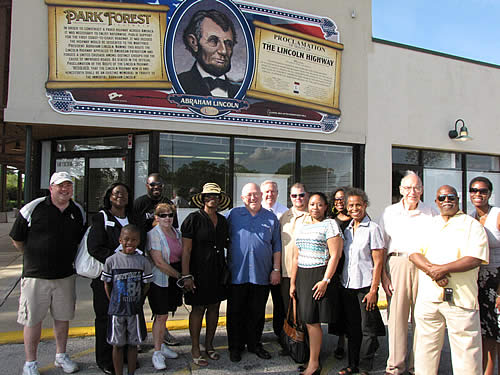
Park Forest, IL-(ENEWSPF)- The Commission on Human Relations chose Juneteenth, June 19, to host the dedication of the Abraham Lincoln Highway sign that will be placed along Route 30 in the near future. The sign will be one of many to be placed along Lincoln Highway. Four have already been installed: University Park, Sauk Village, Frankfort, New Lenox, Chicago Heights, Mokena and Matteson will follow Park Forest.
Jim Garrett, President/CEO of the Chicago Southland Convention & Visitors Bureau talked about the project said there will 36 such signs across all of Lincoln Highway in Illinois. Each sign costs $10,000, paid for by federal and state grants.
Mr. Garrett’s presentation was followed by Park Forester Shannon R. Bond describing the history of Juneteenth.
The text of Ms. Bond’s presentation follows:
President Lincoln’s Emancipation Proclamation became official January 1, 1863. But with so few Union troops to enforce the new Executive Order in Texas, it had been ignored. That is until June 19, 1865 when Union soldiers, led by Major General Gordon Granger, landed at Galveston, Texas with news that the war had ended and the enslaved were free. The General read to the people of Texas, General Order Number 3, which began:
“The people of Texas are informed that in accordance with a Proclamation from the Executive of the United States, all slaves are free. This involves an absolute equality of rights and rights of property between former masters and slaves, and the connection heretofore existing between them becomes that between employer and free laborer.”
The order went on to advise the newly freed slaves to remain quietly where they were and to work for wages, because the government would not tolerate their idleness. Some former slaves did stay, but many left immediately – due to dismal conditions on the plantations and the realization that they could finally leave without being hunted. North was a logical destination for many, but others were desperate to find family members in neighboring states like Louisiana, Arkansas and Oklahoma.
For those freed men and women, recounting the memories of that amazing day in June of 1865 and celebrating it served as motivation as well as a release from the growing pressures encountered in their new lives. The celebration of June 19th was coined “Juneteenth” and grew with more participation from descendants. Having been celebrated annually since 1866, it is the oldest known celebration commemorating the ending of slavery in the United States. Juneteenth was a time for reassuring each other, prayer, gathering family members together and there has always been a focus on education and self-improvement. Some early traditions included rodeos, fishing, barbecuing, baseball, drinking strawberry pop, preparing special dishes using meats that were not commonly available and wearing nice clothes that were not allowed during slavery.
In the early years, some communities barred African Americans from using public property for the celebrations. So the celebrations often had to be held on church grounds, in rural areas and on land owned by African Americans. With the end of the Reconstruction period and the introduction of Jim Crow laws, interest in Juneteenth declined and knowledge of its significance was lost to many.
However, on January 1, 1980, Juneteenth became an official state holiday in Texas. Now, 41 states, including Illinois, recognize the day as a holiday, although only Texas has granted it full state holiday status, allowing government employees to have the day off. The day has also been recognized by Congress as “Juneteenth Independence Day” in America.
The day not only celebrates African American freedom and is a time to honor and pay respect for the inhumane treatment and extreme suffering of slaves, but it also encourages continuous self-development and respect for all cultures. It is no longer a celebration for African Americans, but for all Americans. Large celebrations are held across Texas, in New Orleans, in Boston, in Dallas, in Omaha, in Fort Smith (Arkansas) and events are sponsored by Congress and the Smithsonian in Washington, DC.
We chose Juneteenth, for the dedication of the Lincoln Highway mural, named in honor of President Lincoln because Juneteenth could not have happened without his efforts. Although the Emancipation Proclamation did not end slavery in the nation, it captured the hearts and imagination of millions of Americans and fundamentally transformed the character of the war. After January 1, 1863, every advance of federal troops expanded the domain of freedom. And, the Proclamation announced the acceptance of black men into the Union Army and Navy, enabling the liberated to become liberators. By the end of the war, almost 200,000 black soldiers and sailors had fought for the Union and freedom.
So, as we continue to celebrate Juneteenth, I want to leave you with the words of President Lincoln a month before the Emancipation Proclamation was issued:
“Fellow-citizens, we cannot escape history. … The fiery trial through which we pass, will light us down, in honor or dishonor, to the latest generation. … In giving freedom to the slave, we assure freedom to the free – honorable alike in what we give, and what we preserve. We shall nobly save, or meanly lose, the last best hope of earth. … The way is plain, peaceful, generous, just – a way which, if followed, the world will forever applaud, and God must forever bless.”
-Lincoln’s Second Annual Message to Congress, December 1, 1862.
Video of the presentation:








